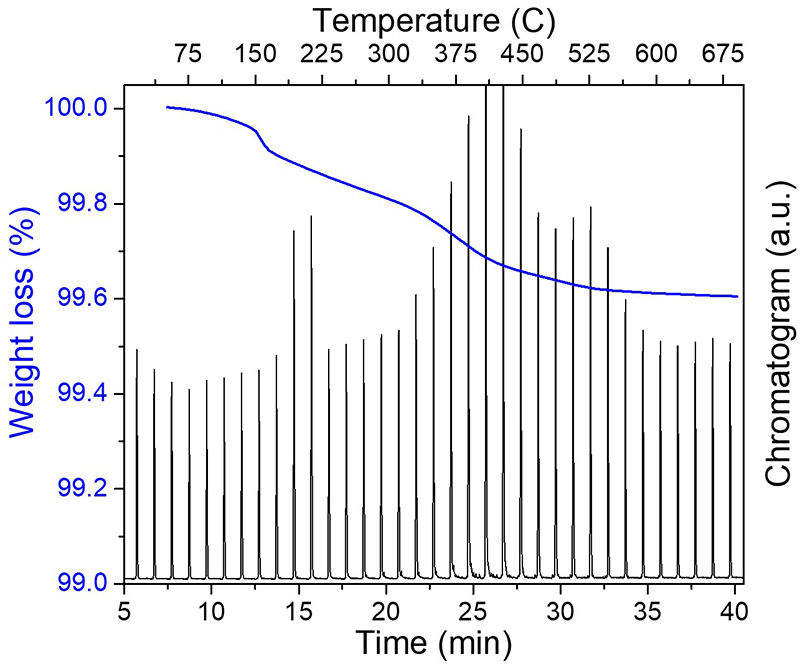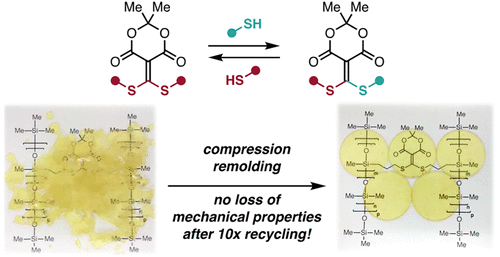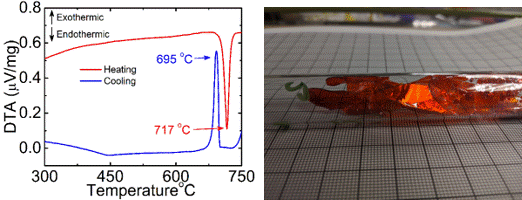Thermal Analysis Coupled with GC-MS and FT-IR
Overview
Thermal analysis is a standard physical characterization technique which can be applied in almost any sample, such as solid, semi-solid, or liquid. IMSERC's instrumentation covers three major thermal analysis methods, i.e., Thermogravimetric Analysis (TGA), Differential Scanning Calorimetry (DSC), and Differential Thermal Analysis (DTA) where mass, enthalpy, and temperature difference can be measured as a function of temperature, respectively. TGA can be measured simultaneously with either DSC or DTA that allows various thermal events to be monitored, such as glass transitions, melting, crystallization, decomposition, evaporation, sublimation, oxidation, and reduction.
Additionally, our simultaneous thermal analysis (STA) instrument can be coupled with a Gas Chromatography-Mass spectrometer which enables the separation and identification of any volatile species coming off the sample. Furthermore, the STA furnace can be coupled with a Fourier-transform infrared spectrometer (simultaneously with the GC-MS unit) for additional characterization capabilities. With the combination of various spectrometers and TGA, each weight loss event in a complex TG trace can be assigned to specific molecules escaping the sample. Please check out some selected publications resulted by IMSERC users along with the list of other physical characterization services available in IMSERC.
User's success story
 Thermal analysis helps you develop a road map for synthesis and crystal growth of novel materials
Thermal analysis helps you develop a road map for synthesis and crystal growth of novel materials
Read more

Applications
- Melting point using either Differential Thermal Analysis or Differential Scanning Calorimetry
- Crystallization transition using either Differential Thermal Analysis or Differential Scanning Calorimetry
- Glass transition using Differential Scanning Calorimetry
- Decomposition temperature using ThermoGravimetric analysis which can be coupled with GC-MS for the identification of the decomposition products
- Temperature of combustion with ThermoGravimetric analysis and identification of combustion volatiles using GC-MS and/or FT-IR
- Determine residual solvents present in solids
- In-situ monitoring of solid-state reactions using Differential Thermal Analysis
Please visit our expanded list of application per research area for more details about this technique.
If you are interested in utilizing any of these applications for your research Start a project
Selected Publications
-
Characterization of drinking water treatment residuals
The diversity of aluminum-based drinking water treatment residuals for use in environmental remediation
Wallace, Samuel M.; Zhang, Yuchi; Zhou, Lang; Ma, Qing; Guise, William E.; Denslow, Nancy D.; Bonzongo, Jean-Claude; Gaillard, Jean-François [10.1039/d2ew00387b]

-
Thermal stability of polymers using Thermogravimetric Analysis coupled with Gas Chromatography and Mass Spectrometry
Vitrimeric Silicone Elastomers Enabled by Dynamic Meldrum's Acid-Derived Cross-Links
Ishibashi, J. S. A.; Kalow, J. A. [10.1021/acsmacrolett.8b00166]

-
Optimization of crystal growth using Differential Thermal Analysis data
Direct thermal neutron detection by the 2D semiconductor LiInP2Se6
Chica, Daniel G.; He, Yihui; McCall, Kyle M.; Chung, Duck Young; Pak, Rahmi O.; Trimarchi, Giancarlo; Liu, Zhifu; De Lurgio, Patrick M.; Wessels, Bruce W.; Kanatzidis, Mercouri G. [10.1038/s41586-019-1886-8]
